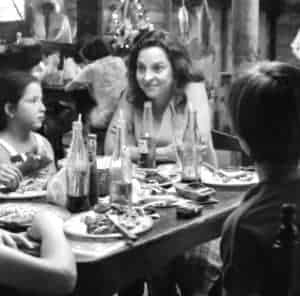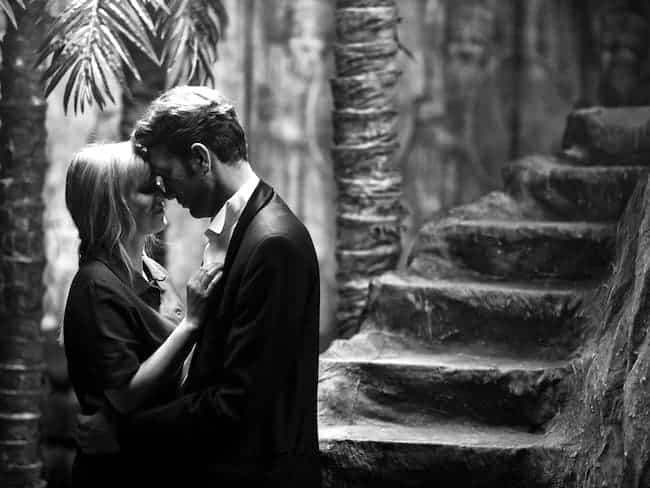Duelling Divas — my film buddy Lisa Jensen and I — continue to ponder our Oscar favorites. . .
CW: Best Cinematography.
It’s gotta be Cold War. Every moment of its eloquent visual storytelling surrounded its central characters with the bohemian allure and political ruin of their eastern european milieu. I admit I was mesmerized by the art direction in The Favourite but while engaged by the camerawork I was too aware of the use of fisheye lenses and other tricks. All of these visual devices worked to push the film’s story around without moving it foreward. If Roma starts sweeping its nominated categories, it will very likely win in this category, but having said that I have to question the softness of imagery and lack of contrast. Instead of crisp blacks and whites, Cuarón gives us fifty shades of grey. The film’s murkiness might be a metaphor for the occluded (polluted) skies of Mexico City.
 The most eloquent black and white cinematography seen in recent decades comes from Cold War’s Lukasz Zal, for his work in Pavel Pawlikowski‘s captivating cinematic love story. His astonishing eye for contrast caresses the tragic lovers in ways that convince you real life should be understood in black and white.
The most eloquent black and white cinematography seen in recent decades comes from Cold War’s Lukasz Zal, for his work in Pavel Pawlikowski‘s captivating cinematic love story. His astonishing eye for contrast caresses the tragic lovers in ways that convince you real life should be understood in black and white.
LJ: I love that two of the nominated film are in black-and-white. The technique doesn’t have to be crisp, for my money, only evocative, which Roma definitely is. Think of it as moody and pearlescent, not grey! And besides the chiaroscuro effect of black-and-white, Cuaron’s compositions are enthralling, even if it’s just water washing over a tile floor. If the Academy wants to give Spike Lee the directing nod, this award could be Cuaron’s “consolation prize.”
CW: I’ll grant you Lisa, that opening of the water on the tiles, and the plane flying overhead reflected in the water—was enthralling. As good as Bergman. But chiaroscuro Roma wasn’t. Very mise en scene, keeping the camera in one place and having life move in and out of it—that can work if there’s some authentic emotional urgency, rather than bombarding us with a string of embarrassing and/or unpleasant incidents. Just didn’t do it for me.
CW: Best Supporting Actress. Is it just me, or is Amy Adams just not much of anything? I have never been  able to figure out why she is even in movies. Anything she can do, Julianne Moore or Nicole Kidman or Julia Roberts can do much better. So she’s out. Emma Stone, who was wonderful and Rachel Weisz, who can do no wrong, cancelled each other out in the sense that they were both equally terrific in roles that literally supported the fabulous Olivia Coleman’s Queen Anne. My money’s on the memorable Marina de Tavira, who helped give depth and emotional shape to Roma.
able to figure out why she is even in movies. Anything she can do, Julianne Moore or Nicole Kidman or Julia Roberts can do much better. So she’s out. Emma Stone, who was wonderful and Rachel Weisz, who can do no wrong, cancelled each other out in the sense that they were both equally terrific in roles that literally supported the fabulous Olivia Coleman’s Queen Anne. My money’s on the memorable Marina de Tavira, who helped give depth and emotional shape to Roma.
LJ: I haven’t seen If Beale Steet Could Talk, or Vice yet, so I can’t comment on Regina King or Amy Adams’ chances. I don’t necessarily think Stone and Weiss cancel each other out because they’re both nominated for the same movie, but they both have recently won Oscars (Stone for La La Land, just two years ago), so probably will not be seen as due for another one so soon. I agree, Maria de Tavira has the inside track here, especially if Roma cleans up in other categories.
CW: Best Supporting Actor. Sam Rockwell is a sly fox and he was a great George W. Bush in Vice. But again, I felt it was more impersonation. He gave us an original character in Three Billboards.  And since I can’t comment on Adam Driver, the ever-perfect, never-won-an-Oscar Sam Elliott, or Richard E Grant, I’ll go with the elegant Mahershala Ali, who made the perfect foil for Viggo, and vice versa. Those two had chemistry to burn. Plus Ali just won the Screen Actor’s Guild award for this part.
And since I can’t comment on Adam Driver, the ever-perfect, never-won-an-Oscar Sam Elliott, or Richard E Grant, I’ll go with the elegant Mahershala Ali, who made the perfect foil for Viggo, and vice versa. Those two had chemistry to burn. Plus Ali just won the Screen Actor’s Guild award for this part.
LJ: Sam Rockwell is out, only because he won in this category last year in Three Billboards. Mahershala Ali won two years ago (and deservedly so) in Moonlight. It’s funny that Adam Driver is nominated in the supporting category when his co-star, John David Washington (who played the black Klansman of the title) was passed over for a Best Actor nomination.
On the other hand, Richard E. Grant was great, caustic, slinky fun in Can You Ever Forgive Me? I don’t think his co-star, Melissa McCarthy will win for Best Actress (she’s de-glamorized in every movie she’s in), but the movie’s insider’s look at literary shenanigans might have enough partisans to tip the gold to Grant.the most reliable character actors in the biz — with perhaps the most distinctive voice — Elliott is overdue for an accoldade, and the high-profile A Star Is Born could be his E ticket.
 CW: Best Film Editing—I’d have to go with Bohemian Rhapsody on this. Seamless movement through time, space, and emotional volume as the camera shifted perfectly from Mercury’s anxieties to edgy rehearsals and up onto the stage itself, offering us the strutting Highness of Queen, as well as the adoring audiences responding. Fabulous immersion into Mercury’s ascent, decline, and legacy.
CW: Best Film Editing—I’d have to go with Bohemian Rhapsody on this. Seamless movement through time, space, and emotional volume as the camera shifted perfectly from Mercury’s anxieties to edgy rehearsals and up onto the stage itself, offering us the strutting Highness of Queen, as well as the adoring audiences responding. Fabulous immersion into Mercury’s ascent, decline, and legacy.
LJ: Um, I never actually notice film editing, unless it’s so clunky, it stops the action cold. As long as the picture keeps moving, I’m happy!
CW: Lisa! I’m shocked. Editing is what propels, or slows, or fixes the narrative arc of a film. Quick cuts move us swiftly, back and forth in time, in and out of a character’s stream of consciousness. The fixed camera forces us to watch the action in real time, creating a whole new rhythm to the storytelling, e.g. Antonioni’s slow, granular vistas as opposed to any one of the James Bond action flicks.
Okay, so how are we feeling about Sound, Costumes, and Screenplays? Stay tuned for our final Oscar installment from Duelling Divas, Christina Waters and Lisa Jensen.
And as a parenthetical note, the Academy has reversed its initial (and utterly lame) announcement to give awards for non-celebrity-filled categories such as Cinematography, Costumes, Screenplays, etc. during commercial breaks at the Oscars on February 24. Whew!



I’d like to see Richard E. Grant win even though I have not seen this film. And I agree with Lisa regarding John David Washington. As for Green Book, good performances but I had some issues with parts of the story. Great sound track though. I wouldn’t mind a win by Viggo.